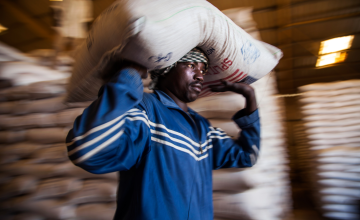Kigali — Executive Secretary of the Economic Commission for Africa, Mr. Carlos Lopes, on Tuesday sought to dispel the common misconception that most migrants trying to reach Europe after crossing the murky waters of the Mediterranean Sea were African.
In his speech to the 27th Ordinary Session of the African Union Executive Council, Mr. Lopes said the perception was far from the truth, adding in fact most Africans who migrate did so to other African countries.
“The continent has the highest intra-continent migration levels in the entire world,” he said. “Human mobility, despite the many limitations that impede regional integration, is progressing well in Africa. In the light of new demographic shifts, young Africans communicate, have better access to transport and feel less of a sense of territorial rigidity than their parents.”
Citing the recent “Brexit” vote in the United Kingdom, Mr. Lopes said young people had voted massively for diversity and integration.
Unfortunately, he said, older people, convinced that their lifestyles were under threat by migrants, voted otherwise.
African youth, Mr. Lopes told the Executive Council meeting which was also attended by African Union Chairperson Nkosazana Dlamini-Zuma, were leaving their countries despite high growth but mainly for other African countries and not Europe.
So far this year, the Italian coast guard has rescued more than 30,000 people from the Mediterranean Sea and the majority, 68 percent, were not African; coming rather from Syria, Afghanistan, Iraq and Pakistan.
Last year, more than one million people crossed the Mediterranean to reach Europe, many through Italy and of the top ten nationalities represented, only one in ten was African as confirmed by Frontex, the European agency dealing with the issue.
According to official statistics 250 million people currently live outside their countries of origin and in those 250 million, only 8.5 per cent is African.
He said improvements in literacy rates, transport, ICT and public infrastructure in the last century have significantly influenced migration and transnational social connectivity and vice-versa, adding as a result remittances sent by migrants to developing countries were large (second largest source of development finance after foreign direct investment); rising (increased almost 100 per cent between 1999 and 2004), stable (with less volatility than capital market flows or development assistance), and do not require interest or capital payments.
The ECA Executive Secretary said a more hopeful view sees migrants serving as bridges or connectors, providing access to markets, sources of investment and expertise, while also helping to shape public debate, articulate reform plans and help implement reforms and new projects. Migrants, he said, are acquiring cosmopolitan competences, adding they live in the era of Skype, Viber and WhatsApp as those once referred to as “the uprooted” are now often being called “transnationals”.
“This sensitivity is a result of studies underscoring the ways in which international migration cuts across national borders to produce a range of dynamic cross-border connections,” said Mr. Lopes, adding; “No walls being erected in many parts of the world will deter such a trend.”
He said not every migrant is seeking ambition, adding some leave because they are compelled to because of desperation, in particular conflicts.
UNHCR lists around 14 million Africans as “people of concern”, the highest number since statistics started being kept.
Mr. Lopes will be attending the AU Summit in Kigali alongside African Heads of State and Government and other top dignitaries.


